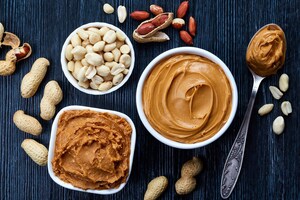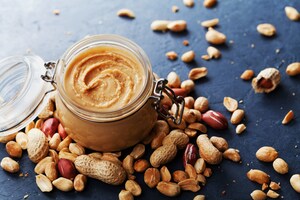Peanut-enriched Group Lost Weight Despite Extra 400 Calories Per Day
ALBANY, Ga., July 26, 2022 /PRNewswire/ -- A recent study from the University of South Australia found daily consumption of lightly salted peanuts twice a day before meals led to weight loss, lowered blood pressure and improved fasting glucose levels [1]. The findings were recently published online in the peer-reviewed journal Nutrients and shared by The Peanut Institute.
The two-arm, parallel randomized controlled trial was conducted from January to December 2021 and led by two professors from the University of South Australia. Dr. Jennifer Keogh, associate professor of dietetics and nutrition, and Dr. Peter Clifton, professor of nutrition, were the principal investigators. Dr. Kristina Petersen, assistant research professor in the department of nutritional sciences at Texas Tech University, was a collaborator.
"Our study found that peanuts, which are high in healthy unsaturated fats, can actually aid weight loss," said Dr. Petersen. "Peanuts are often avoided when people are trying to lose weight because they believe peanuts contain too many calories. However, peanuts actually have a high satiety value so that means they keep you feeling fuller longer and that can be really helpful for those on a weight loss diet."
The study included two groups of Australian adults who were at moderate or high risk for type 2 diabetes. Both groups received weight loss education. The control group of 50 adults was instructed to avoid eating any nuts or nut butter. The peanut-enriched group of 57 adults consumed 35 grams of lightly salted, dry-roasted peanuts twice a day 30 minutes before meals.
After six months, researchers found:
- Statistically Significant Weight Loss - Both groups lost a similar amount of weight, despite the fact that the peanut-enriched group was consuming an extra 400 calories a day from the addition of a total of 70 grams (2.5 ounces) of peanuts to their diet. The peanut-enriched group lost 6.72 kg or 14.78 lbs. while the control group lost 6.60 kg or 14.52 lbs.
- Lower Blood Pressure - Greater systolic blood pressure reductions were seen in the peanut-enriched group than the control group. The peanut group lowered their systolic blood pressure by 5 mmHg, which is associated with a 10% reduction in risk for major cardiovascular events.
- Improved Blood Sugar Levels - Both groups saw improved fasting glucose and insulin control, as well as improved HbA1c, which is a measure of long-term blood sugar control.
Peanuts Deliver Satiety
It's widely understood that foods high in protein and fiber deliver a feeling of fullness that can help reduce the urge to snack or overeat. Peanuts are considered a protein powerhouse since a one ounce serving delivers seven grams of protein, nearly 3 grams of fiber and 19 vitamins and minerals.
In the University of South Australia research, the peanut-enriched group was getting approximately an extra 15 grams of protein just from their consumption of peanuts.
Peanuts Lower Blood Pressure
Even though the peanuts were lightly salted, participants still saw improved systolic blood pressure compared to those in the control group. Dr. Petersen offers a potential explanation for this seemingly contrary result:
- Lightly salted peanuts are actually a low-sodium food, usually containing between 90-100mg per serving.
- Peanuts contain one of the highest levels of arginine, an amino acid that helps to dilate blood vessels and lower blood pressure.
- Peanuts are an excellent source of magnesium, a mineral known to help regulate blood pressure.
Peanuts Stabilize Blood Sugar
The Australian study also found the peanut-enriched group experienced improved glucose levels, which is consistent with previous research. The past few years, a number of studies have found that peanuts and peanut butter can be a powerful tool to help diabetics live a healthier life and prevent the onset of type 2 diabetes.
"Peanuts are nutrient dense and illustrate the concept of food as medicine," said Dr. Samara Sterling, research director for The Peanut Institute. "When you eat peanuts and peanut butter, you're ingesting three macronutrients – protein, fiber and healthy monounsaturated and polyunsaturated fats – and 19 micronutrients. Regularly choosing foods that contribute to your overall health is a positive action that can deliver life-long benefits."
For more information on peanuts and peanut butter and their impact on health, visit peanutinstitute.com or follow The Peanut Institute on Instagram, Facebook or Twitter.
Based in Albany, Ga., The Peanut Institute is a non-profit organization supporting nutrition research and developing educational programs to encourage healthful lifestyles that include peanuts and peanut products. The Peanut Institute pursues its mission through research programs, educational initiatives and the promotion of healthful lifestyles to consumers of all ages. As an independent forum, The Peanut Institute is uniquely positioned to work with all segments of the food industry, the research community, academia, consumer organizations and governmental institutions.
Source:
1. Petersen KS, Murphy J, Whitbread J, Clifton PM, Keogh JB. The Effect of a Peanut-Enriched Weight Loss Diet Compared to a Low-Fat Weight Loss Diet on Body Weight, Blood Pressure, and Glycemic Control: A Randomized Controlled Trial. Nutrients. 2022; 14(14):2986. https://doi.org/10.3390/nu14142986
SOURCE The Peanut Institute

WANT YOUR COMPANY'S NEWS FEATURED ON PRNEWSWIRE.COM?
Newsrooms &
Influencers
Digital Media
Outlets
Journalists
Opted In






Share this article